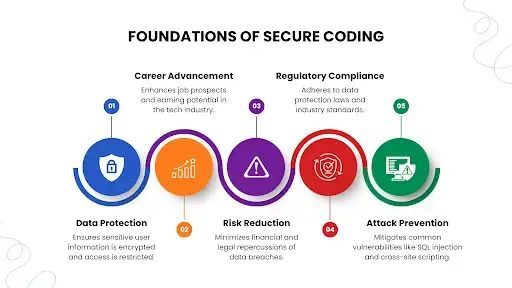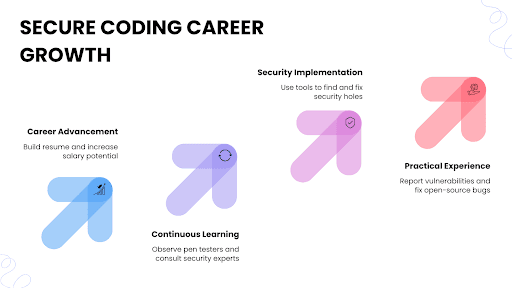
How Learning Secure Coding Can Boost Your Career (and Your Paycheck)?
Learning secure coding boosts your career by preventing vulnerabilities, improving app security, and increasing your value to employers. Developers skilled in OWASP, encryption, and defensive coding earn higher salaries and land top roles in cybersecurity.
Published On: 16 July, 2024
3 min read
Table of Contents
Since software development plays a major role in daily and business life, its security has become important. These days, developers focus on making apps that can withstand typical assaults like SQL injection and cross-site scripting.
You are now in charge of protecting user information, payment information, medical records, and business data from these attacks, regardless of how experienced you are with all of this. Learning to write secure code alters your perspective on data handling, login configuration, and information verification. Instead of addressing breaches and data leaks later, it entails preventing issues like buffer overflows and malfunctioning access controls early on.
In this article, we'll check out how understanding the OWASP top 10 problems, using good login methods, and coding defensively can help you get better jobs as senior developers and security engineers. You could land a spot at big companies or startups with solid security, and maybe even boost your salary by $15,000-$40,000 compared to those without security skills.
Why Is Secure Coding a Big Deal?

With everything connected these days, even a small mistake in your code can be a way for attackers to steal credentials or mess with your system. Secure coding helps prevent these attacks and keeps important info safe. Here’s why it matters.
Keeps User Data Safe
You need to encrypt, manage sessions safely, and limit who can view what if you're working with credit card data, social security numbers, health records, and passwords. Secure code keeps consumers happy and protects others from getting into your system without permission, which helps you avoid fines.
Stops Attacks
Secure coding fixes problems like SQL injection (which lets attackers acquire whole databases), cross-site scripting (which lets them steal session cookies), and buffer overflows (which lets them execute their own code). You can develop apps that are hard to hack if you follow excellent coding rules.
Lowers Risks
Data breaches are expensive. Getting rid of a coding problem early on is cheap, but fixing it after a breach can cost millions in fees, legal stuff, and customer notifications. According to IBM, the global average cost of a data breach was 4.4M in USD, which highlights how costly coding issues can be.
Meets the Rules
There are rules about keeping data safe, and secure coding helps you follow them. If you know about secure session management and encryption, you can help your company pass audits and avoid big fines.
Makes Things More Secure
A lot of attacks happen through application code. By using secure code reviews and testing, you can cut down on weaknesses and keep bad code from going live. Every layer of your stack, including frequently disregarded areas like localization and translation management, is affected by this security-first mentality, which goes beyond the core application logic. The security architecture is important when managing multilingual content that might include private user or corporate data. To meet varying security needs, platforms such as Tolgee provide a range of deployment options, from self-hosted environments with complete data control to cloud-hosted solutions.
Helps You Get Hired
Big companies want people who know about security. If you know the OWASP Top 10, how to encrypt data, and how to log in securely, you'll do well in those technical interviews. Also, there aren't enough cybersecurity experts, so possessing these abilities may actually help you find a job and make more money.
Keeps Software Going Strong
Code that is secure needs fewer patches and less upkeep. You may avoid frequent difficulties and save money in the long term by following basic practices.
For developers looking to move up, secure coding is worth it. With companies caring more about application security, knowing how to code securely is almost a must for those better-paying jobs.
Key Benefits of Secure Coding Skills
Get Paid More
Companies will often pay you 15-35% more if you have security certs like CSSLP, GSSP, or OSCP. And they might give you a signing bonus of $12,000-$25,000 if you're good at secure APIs, crypto, and testing for weaknesses. Senior security engineers can make $135,000-$180,000 plus stock. And if you're a freelance security consultant, you could charge $150-$300 an hour to check apps and teach about secure code.
Work from Anywhere
If you want to work for companies all over the world, like in Europe, California, or Brazil, you need to know about privacy and how to keep data safe with things like AES-256 and OAuth 2.0. Companies like GitLab and Toptal will let you work from home as a security engineer and pay you $140,000-$200,000 per year. Or, if you work with European or Asian companies, you could get paid $120-$250 an hour to help them follow rules about online payments.
High-Paying Roles for Secure Coding Experts
Knowing how to code securely can land you some of the best-paying jobs out there. Here are some careers where it really counts:
Application Security Engineer/AppSec Developer
These guys team up with product teams to build security right into applications. They look at possible threats, check code, and use programs to find problems. Since they get both coding and hacking, they're wanted. AppSec engineers can make serious money.
In 2025 cybersecurity professionals with secure coding expertise earn between $120,000 and $250,000+ annually. And, this job is blowing up, with a projected 41% increase between 2025 and 2040, plus over 7,600 jobs already open this year.
DevSecOps Engineer
This job puts security right into the development process. These pros automate security checks like scans for weak points and work with developers to apply security rules.
Their mix of coding, plus cloud stuff and automation, plus security smarts makes them pretty rare and gets them paid well.
Security Architect
These people plan out the whole security setup for systems. They need to be able to read and write code to really get how systems work and decide on coding rules for teams.
Ethical Hacker and Penetration Tester
These are the folks who try to hack into systems to find coding errors to fix. You need good coding skills to write test programs and exploits.
Penetration testers tend to make more than regular security analysts, especially with certs like OSCP or CEH.
Chief Information Security Officer (CISO)
At the top, a CISO looks after a company’s security, including how securely they develop software. CISOs usually know development or are tech experts. These executives are paid big bucks. CISOs in the U.S. can rake in from $150,000 to $250,000 or even more each year.
Basically, knowing secure coding can get you a job at any level, from doing the work to being in charge, and you can bet the pay is above average.
How Secure Coding Raises Your Value?

Participate in bug bounty programs and make money by reporting real vulnerabilities. Contribute fixes to open-source projects. Keep track of around 10-15 vulnerabilities you've found and fixed, because that is what shows your practical work during tech interviews.
Put it Into Place
Use tools to find security holes in code. Make sure to replace old-school SQL queries with better, safer ones to block injection attacks. Add security measures to all your web pages make sure pipelines block any deployments that have high-severity findings. If you cut production bugs to almost nothing for six months, you could get promoted and get a pretty nice raise.
Learn From Others
Watch what pen testers do when they're trying to hack systems. Have security experts look at your API designs. Go to meetings to break down applications and figure out where the security risks are. Playing with others helps you see security defense patterns, and you will reduce vulnerabilities!
Every certification you get, every bug you fix, it all builds up your resume. Recruiters on LinkedIn will hunt for people with those skills, and in expensive cities, you can get paid way more. Knowing secure coding can seriously increase your salary!
Conclusion
In 2024, the software business saw 375,000 new cybersecurity jobs pop up, says CyberSeek. At the same time, app weaknesses jumped 23% from last year, according to Veracode's State of Software Security Report. These days, companies want coders who do more than just make stuff that works. They need engineers who can stop SQL injection in database searches, get JWT token checking right when people log in, and set up Content Security Policy headers to keep out XSS attacks.
Knowing how to code safely can really boost your career. Certifications like CEH (median pay of $125,000) and OSCP (median pay of $132,000) show you know your stuff. It also helps clients chill out, because you're preventing hacks that could sink 60% of small shops in half a year, says the National Cyber Security Alliance. Plus, it means you're more likely to stick around in a job. These roles had 0% layoffs when the tech world tanked in 2023. This means coders can make sure features get out on time and still ace those security tests, which is what you need to pass a SOC 2 audit.
Don’t Have Time To Read Now? Download It For Later.
Table of Contents
Since software development plays a major role in daily and business life, its security has become important. These days, developers focus on making apps that can withstand typical assaults like SQL injection and cross-site scripting.
You are now in charge of protecting user information, payment information, medical records, and business data from these attacks, regardless of how experienced you are with all of this. Learning to write secure code alters your perspective on data handling, login configuration, and information verification. Instead of addressing breaches and data leaks later, it entails preventing issues like buffer overflows and malfunctioning access controls early on.
In this article, we'll check out how understanding the OWASP top 10 problems, using good login methods, and coding defensively can help you get better jobs as senior developers and security engineers. You could land a spot at big companies or startups with solid security, and maybe even boost your salary by $15,000-$40,000 compared to those without security skills.
Why Is Secure Coding a Big Deal?

With everything connected these days, even a small mistake in your code can be a way for attackers to steal credentials or mess with your system. Secure coding helps prevent these attacks and keeps important info safe. Here’s why it matters.
Keeps User Data Safe
You need to encrypt, manage sessions safely, and limit who can view what if you're working with credit card data, social security numbers, health records, and passwords. Secure code keeps consumers happy and protects others from getting into your system without permission, which helps you avoid fines.
Stops Attacks
Secure coding fixes problems like SQL injection (which lets attackers acquire whole databases), cross-site scripting (which lets them steal session cookies), and buffer overflows (which lets them execute their own code). You can develop apps that are hard to hack if you follow excellent coding rules.
Lowers Risks
Data breaches are expensive. Getting rid of a coding problem early on is cheap, but fixing it after a breach can cost millions in fees, legal stuff, and customer notifications. According to IBM, the global average cost of a data breach was 4.4M in USD, which highlights how costly coding issues can be.
Meets the Rules
There are rules about keeping data safe, and secure coding helps you follow them. If you know about secure session management and encryption, you can help your company pass audits and avoid big fines.
Makes Things More Secure
A lot of attacks happen through application code. By using secure code reviews and testing, you can cut down on weaknesses and keep bad code from going live. Every layer of your stack, including frequently disregarded areas like localization and translation management, is affected by this security-first mentality, which goes beyond the core application logic. The security architecture is important when managing multilingual content that might include private user or corporate data. To meet varying security needs, platforms such as Tolgee provide a range of deployment options, from self-hosted environments with complete data control to cloud-hosted solutions.
Helps You Get Hired
Big companies want people who know about security. If you know the OWASP Top 10, how to encrypt data, and how to log in securely, you'll do well in those technical interviews. Also, there aren't enough cybersecurity experts, so possessing these abilities may actually help you find a job and make more money.
Keeps Software Going Strong
Code that is secure needs fewer patches and less upkeep. You may avoid frequent difficulties and save money in the long term by following basic practices.
For developers looking to move up, secure coding is worth it. With companies caring more about application security, knowing how to code securely is almost a must for those better-paying jobs.
Key Benefits of Secure Coding Skills
Get Paid More
Companies will often pay you 15-35% more if you have security certs like CSSLP, GSSP, or OSCP. And they might give you a signing bonus of $12,000-$25,000 if you're good at secure APIs, crypto, and testing for weaknesses. Senior security engineers can make $135,000-$180,000 plus stock. And if you're a freelance security consultant, you could charge $150-$300 an hour to check apps and teach about secure code.
Work from Anywhere
If you want to work for companies all over the world, like in Europe, California, or Brazil, you need to know about privacy and how to keep data safe with things like AES-256 and OAuth 2.0. Companies like GitLab and Toptal will let you work from home as a security engineer and pay you $140,000-$200,000 per year. Or, if you work with European or Asian companies, you could get paid $120-$250 an hour to help them follow rules about online payments.
High-Paying Roles for Secure Coding Experts
Knowing how to code securely can land you some of the best-paying jobs out there. Here are some careers where it really counts:
Application Security Engineer/AppSec Developer
These guys team up with product teams to build security right into applications. They look at possible threats, check code, and use programs to find problems. Since they get both coding and hacking, they're wanted. AppSec engineers can make serious money.
In 2025 cybersecurity professionals with secure coding expertise earn between $120,000 and $250,000+ annually. And, this job is blowing up, with a projected 41% increase between 2025 and 2040, plus over 7,600 jobs already open this year.
DevSecOps Engineer
This job puts security right into the development process. These pros automate security checks like scans for weak points and work with developers to apply security rules.
Their mix of coding, plus cloud stuff and automation, plus security smarts makes them pretty rare and gets them paid well.
Security Architect
These people plan out the whole security setup for systems. They need to be able to read and write code to really get how systems work and decide on coding rules for teams.
Ethical Hacker and Penetration Tester
These are the folks who try to hack into systems to find coding errors to fix. You need good coding skills to write test programs and exploits.
Penetration testers tend to make more than regular security analysts, especially with certs like OSCP or CEH.
Chief Information Security Officer (CISO)
At the top, a CISO looks after a company’s security, including how securely they develop software. CISOs usually know development or are tech experts. These executives are paid big bucks. CISOs in the U.S. can rake in from $150,000 to $250,000 or even more each year.
Basically, knowing secure coding can get you a job at any level, from doing the work to being in charge, and you can bet the pay is above average.
How Secure Coding Raises Your Value?

Participate in bug bounty programs and make money by reporting real vulnerabilities. Contribute fixes to open-source projects. Keep track of around 10-15 vulnerabilities you've found and fixed, because that is what shows your practical work during tech interviews.
Put it Into Place
Use tools to find security holes in code. Make sure to replace old-school SQL queries with better, safer ones to block injection attacks. Add security measures to all your web pages make sure pipelines block any deployments that have high-severity findings. If you cut production bugs to almost nothing for six months, you could get promoted and get a pretty nice raise.
Learn From Others
Watch what pen testers do when they're trying to hack systems. Have security experts look at your API designs. Go to meetings to break down applications and figure out where the security risks are. Playing with others helps you see security defense patterns, and you will reduce vulnerabilities!
Every certification you get, every bug you fix, it all builds up your resume. Recruiters on LinkedIn will hunt for people with those skills, and in expensive cities, you can get paid way more. Knowing secure coding can seriously increase your salary!
Conclusion
In 2024, the software business saw 375,000 new cybersecurity jobs pop up, says CyberSeek. At the same time, app weaknesses jumped 23% from last year, according to Veracode's State of Software Security Report. These days, companies want coders who do more than just make stuff that works. They need engineers who can stop SQL injection in database searches, get JWT token checking right when people log in, and set up Content Security Policy headers to keep out XSS attacks.
Knowing how to code safely can really boost your career. Certifications like CEH (median pay of $125,000) and OSCP (median pay of $132,000) show you know your stuff. It also helps clients chill out, because you're preventing hacks that could sink 60% of small shops in half a year, says the National Cyber Security Alliance. Plus, it means you're more likely to stick around in a job. These roles had 0% layoffs when the tech world tanked in 2023. This means coders can make sure features get out on time and still ace those security tests, which is what you need to pass a SOC 2 audit.
Share to:

Written By:
Harram ShahidHarram is like a walking encyclopedia who loves to write about various genres but at the t... Know more
Get Help From Experts At InvoZone In This Domain
